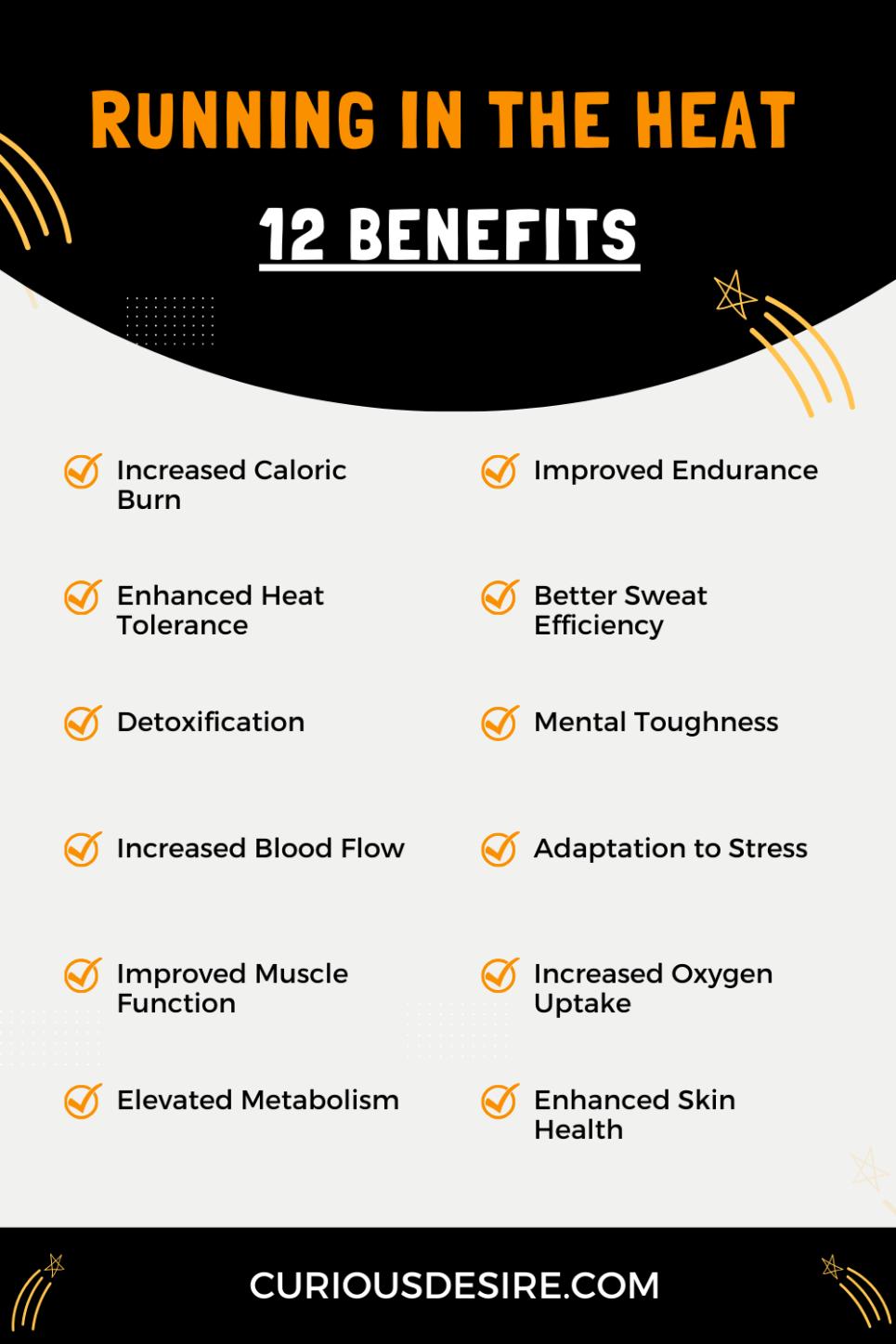Throughout history, humans have tried different things to figure out what works best for them in their running routines.
They’ve experimented with various distances, timings, and even diverse environments, ranging from freezing cold to scorching heat.
Today, we’ll explore the specific advantages of running in the heat, helping you understand how this environmental factor can add value to your running routine and offer numerous benefits.
Here are the top 5 benefits of running in the heat:
- Better Heat Tolerance
- Enhanced Skin Health
- Increased Oxygen Uptake
- Improved Endurance
- Increased Caloric Burn
[toc]

Benefit 1: Increased Caloric Burn
One of the top and most amazing benefits of running in the heat is its ability to help you burn more calories.
It’s not just about breaking a sweat; running in warmer conditions increases the calories and fat you burn compared to cooler weather.
Recent studies support this idea, explaining that your body tends to sweat more during workouts in hot conditions as a way to regulate its temperature.
The increased sweating makes your heart and body work harder to pump blood to the skin’s surface for cooling.
In simpler terms, sweating it out in the heat gives a natural boost to burning calories, making it a helpful ally for managing weight and improving overall fitness.
Benefit 2: Improved Endurance
Running in the heat presents a challenge that can benefit your cardiovascular system.
The warmth requires your heart and lungs to work harder, fostering improvement over time.
This adaptation leads to increased endurance, allowing you to go longer and stronger, whether you’re gearing up for a race or simply aiming to enhance your overall fitness levels.
Benefit 3: Enhanced Heat Tolerance
Exposing yourself to warm temperatures regularly helps your body get used to the heat. Spartan Race confirms the fact that working or working out like running in a heat setting develops heat tolerance in individuals
This adaptability is a big plus, especially if you live in a hot climate or plan to participate in events held in warmer conditions.
As your body becomes more accustomed to dealing with heat stress, you’ll find that you’re more comfortable and capable during runs in challenging weather.
This increased tolerance not only boosts your performance but also lowers the risk of heat-related problems.
Benefit 4: Better Sweat Efficiency
When you run in the heat, your body becomes good at sweating efficiently.
Sweating is like your body’s own built-in air conditioner, and being good at it helps control your temperature, as the water in the sweat evaporates, the surface of the skin cools (source).
This is especially beneficial for preventing yourself from getting too hot during tough workouts. As you get better at sweating efficiently, your body gets better at staying cool.
This means you can push yourself harder in your workouts without worrying about getting overheated.
It’s like your body’s way of handling the heat, keeping you comfortable and allowing you to do your exercise in a better way.
Benefit 5: Detoxification
Running in the sun is not just about working up a sweat – it’s like giving your body a natural detox.
Even the National Institute of Health agrees, stating that physiologists have recognized sweating as a safe and effective way to eliminate toxins, with heavy metals being excreted through sweat.
So, when you break a sweat, you’re helping your body get rid of toxins, providing a kind of refreshing internal cleanse. Of course, it’s crucial to stay hydrated to support this process.
The combination of sweating due to the heat and replenishing fluids during your run becomes a dynamic duo, working together to flush out impurities.
Benefit 6: Mental Toughness
Navigating the discomfort and pushing through the heat builds mental resilience. Therefore, running in the heat isn’t just a physical challenge; it’s a mental workout too.
The mental strength you gain from hot-weather running isn’t just confined to your workouts; it seeps into your everyday life, teaching you to persevere when conditions aren’t ideal.
Benefit 7: Increased Blood Flow
Warmer temperatures trigger your body to increase blood flow to the skin for cooling.
The Ven Institute of New Jersey highlights that running in high temperatures leads to enhanced blood flow to the extremities, bringing several advantages.
Firstly, this increased circulation ensures that your muscles receive a continuous supply of oxygen and nutrients during exercise, thereby enhancing your overall performance.
Moreover, improved blood flow supports cardiovascular health, reducing the risk of heart-related issues.
Therefore, running in the heat is seen as a holistic approach to maintaining the health of your heart.
Benefit 8: Adaptation to Stress
Running in the heat throws a controlled form of stress your way, and your body adapts to handle it better.
This adaptation isn’t just about dealing with physical stress during runs but extends to coping more efficiently with life’s stresses.
It’s like a training program for your body and mind, making you better equipped to handle challenges both in and out of your workout sessions.
Benefit 9: Improved Muscle Function
Running in the heat can bring remarkable benefits to your muscles.
As suggested by scientific research highlighted in ScienceDirect, heat appears to offer potential advantages for skeletal muscle mass gain and muscle force improvement.
There are several reasons why this heat contributes to these benefits.
Firstly, the heat makes your muscles more flexible, reducing the risk of injuries. Warm muscles act like elastic bands, allowing for a broader range of motion and decreasing the likelihood of strains.
Secondly, the increased blood flow to your muscles during hot-weather runs ensures they receive the necessary oxygen and fuel to perform at their best.
This dual effect enhances overall muscle function, reducing the likelihood of fatigue or cramps during your runs.
Benefit 10: Increased Oxygen Uptake
Running in the heat makes your whole body work harder, including your lungs. As you breathe in warmer air, your lungs adapt to the increased demand for oxygen.
This adaptation leads to improved lung capacity and efficiency over time.
Better oxygen uptake not only boosts your performance while running but also supports overall respiratory health, making you more resilient in various physical activities.
Benefit 11: Elevated Metabolism
The heat serves as a natural kickstarter for your metabolism. In hot weather, metabolism increases because the body strives to maintain balance through sweating, which demands additional energy—studies confirm this.
This heightened effort leads to a boosted metabolic rate, translating to more calories burned even during periods of inactivity.
Running in the heat isn’t a replacement for regular exercise, but it can boost your metabolism, which helps with weight management and overall metabolic health.
Benefit 12: Enhanced Skin Health
When you run in the heat, the increased blood flow and sweating do wonders for your skin. Better blood circulation means your skin gets more of the nutrients it needs, giving you a healthier and more radiant complexion (source).
Sweating, which is your body’s natural way of cooling down, also does good things for your skin. It helps keep your pores clear, lowering the chances of having skin issues.
Of course, taking care of your skin in the right way is important, but running in the heat can definitely contribute to having and keeping your skin looking healthy.
Running In The Heat Benefits FAQs
Is there a benefit to running in the heat?
Running in the heat can have some benefits, such as an increased metabolism, which may aid in weight management and overall metabolic health. However, it’s essential to balance the potential advantages with the risks associated with high temperatures.
Is it OK to run in 100-degree weather?
Running in 100-degree weather can pose risks such as dehydration, heat exhaustion, and heatstroke.
It’s generally not recommended unless you take precautions, such as hydrating well, choosing cooler times of the day, and paying attention to your body’s signals.
Is it safe to run in 90-degree weather?
Running in 90-degree weather can be safe if you take the necessary precautions.
Stay hydrated, wear light and breathable clothing, and consider running during cooler parts of the day, such as early morning or late evening.
Are there benefits to working out in the heat?
Exercising in the heat can improve cardiovascular fitness, enhance heat tolerance, and potentially lead to better performance in hot conditions.
It’s important to acclimate gradually and stay well-hydrated during hot workouts.
What temperature is too hot to jog?
There’s no one-size-fits-all answer, as it depends on factors like humidity and individual tolerance.
However, temperatures above 90 degrees Fahrenheit (32 degrees Celsius) can increase the risk of heat-related illnesses, and caution should be taken.
What are the 3 signs of heat exhaustion?
- Heavy Sweating: Profuse sweating is a common sign of heat exhaustion.
- Weakness or Fatigue: Feeling weak, tired, or dizzy can indicate heat exhaustion.
- Nausea or Vomiting: Upset stomach and vomiting are symptoms to watch for.
At what temperature is it unsafe to run outside?
The safety of running outside depends on various factors, but temperatures above 90 degrees Fahrenheit (32 degrees Celsius) can be considered potentially unsafe.
High humidity can exacerbate the risk of heat-related issues.
How do you run in 90-degree heat?
- Stay Hydrated: Drink water before, during, and after your run.
- Choose the Right Time: Run during cooler parts of the day, like early morning or late evening.
- Wear Light Clothing: Opt for breathable, light-colored attire to stay cool.
- Use Sunscreen: Protect your skin from sunburn with sunscreen.
- Listen to Your Body: Pay attention to signs of overheating and adjust your pace or stop if necessary.
What happens to the body in 90-degree weather?
In 90-degree weather, the body may experience increased sweating to cool down.
However, prolonged exposure can lead to dehydration, heat exhaustion, or even heatstroke. It’s crucial to take precautions to avoid these conditions.

